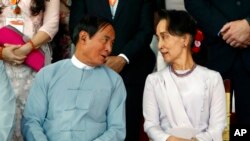Myanmar's Supreme Court reportedly will hear appeals by ousted leader Aung San Suu Kyi of her convictions for corruption, election fraud and violations of state secrets laws.
Suu Kyi was arrested February 1, 2021, when Myanmar's military, the Tatmadaw, seized power in a coup against her recently re-elected civilian-led government, driving the country into yet another period of violent conflict.
The 77-year-old is serving 33 years in prison after a slew of convictions in more than a dozen cases that took place behind closed doors. Suu Kyi and her allies have denied the charges against her and have condemned the prosecutions as politically motivated.
Now, the country's Supreme Court said Wednesday that it would hear the appeals of Suu Kyi and co-defendant Win Myint, the ousted former president, according to reports from Reuters and The Associated Press. No date has been set.
"The judge accepted the proposals to listen to the appeals on those seven cases," a source familiar with the matter told Reuters.
Suu Kyi has been convicted on several charges ranging from illegally importing and possessing walkie-talkies to committing sedition and violating coronavirus restrictions. She is being held in an annex of a prison in Myanmar's capital, Naypyitaw.
Most appeals filed by Suu Kyi's lawyers have been rejected.
The Supreme Court agreed to hear an appeal of a corruption case in which Suu Kyi was convicted of abusing her position and causing a loss of state funds, the AP reported.
It also said it would hear a request for a reduced sentence in a case involving Myanmar's official secrets act, according to the AP, as well as an election fraud case.
But analysts say this latest move from the Supreme Court is just a political show that is designed to make the military appear more lenient than it actually is.
The military wants to create the facade that it respects the rule of law, including the right to appeal, according to Zaw Tuseng, president of the Myanmar Policy Institute.
"However, the military controls all the powers — executive, judicial and legislative. This could be to respond to pressures coming from ASEAN and people on the ground," Tuseng told VOA, referring to the Association of Southeast Asian Nations.
"What they must do is just release her and all political detainees," Tuseng added.
Since the coup, the military has killed upward of 3,400 people to try to quell resistance, and more than 17,500 people are detained for resisting the coup, according to the Bangkok-based Assistance Association for Political Prisoners.
Wai Wai Nu, a Rohingya human rights activist and founder of the Women's Peace Network, agreed this move is likely a ploy from the military "to show the international community that they are progressive, so that they can actually gain some legitimacy."
These kinds of political shows are nothing new for the Tatmadaw.
Just this week, the Tatmadaw released more than 3,000 prisoners to mark the Burmese New Year. But only one political prisoner — former Minister of Planning and Finance Kyaw Win — was among those released, Radio Free Asia reported.
Meanwhile, as the Tatmadaw has shown signs of weakening over the past several months, it has intensified its efforts to control the country through airstrikes and scorched-earth campaigns against ethnic minority armies, pro-democracy resistance groups and civilians. U.N. officials have said the military's post-coup abuses likely constitute war crimes and crimes against humanity.
Nu believes the potential appeal may also be a signal the military is open to negotiating with Suu Kyi. "Maybe they are trying to find a way out," Nu told VOA.
Earlier this month, the International Court of Justice, or ICJ, granted Myanmar an extension until May 24 to file its countermemorial in an ongoing Rohingya genocide case. The initial deadline was April 24. Myanmar had requested an extension until February 24, 2024.
In July last year, the ICJ rejected Myanmar's preliminary objections in the case, paving the way for the trial to move forward.
Human rights groups and U.N. officials have accused Suu Kyi, a once internationally acclaimed Nobel peace laureate, of complicity in the alleged genocide.
Some information for this report came from Reuters and The Associated Press.




